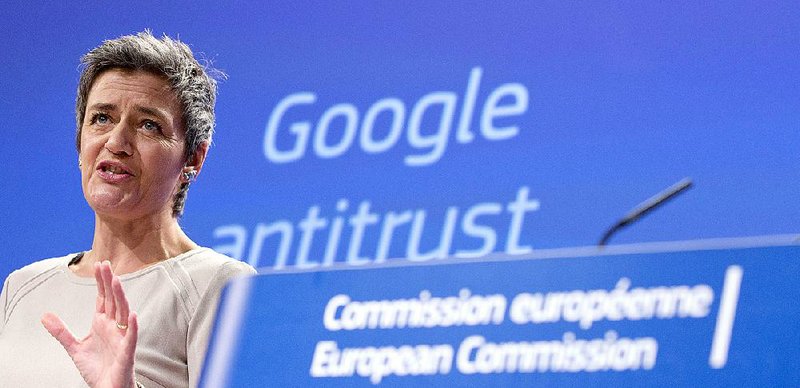BRUSSELS -- The European Union on Wednesday escalated its 4-year-old investigation into Google Inc., accusing the Internet giant of abusing its dominance of the search-engine market. The EU also started a new investigation into Google's Android mobile-phone software.
The move could lead to billions in fines for Google if the case shows that the way it does business in the 28-country bloc is illegal. It also likely started years of legal wrangling.
The European Union can impose fines of 10 percent of annual revenue, or some $6 billion, and force the company to overhaul its system for recommending websites in Europe.
The European Union's executive commission said it found that Google "gives systematic favorable treatment" to businesses that are aligned with Google Shopping at the expense of other businesses in its general search results.
Margrethe Vestager, the EU's competition commissioner, said that was a problem because Google is so dominant in Europe.
"It is not based on the merits of Google Shopping that Google Shopping always comes up first," Vestager said. "Dominant companies have a responsibility not to abuse their powerful market position."
The European market contributes about 35 percent of Google's revenue, according to Carlos Kirjner, a New York-based analyst at Sanford C. Bernstein & Co. Google's market share in search exceeds 90 percent in most European markets, compared with about 65 percent in the U.S.
Regulators allege Google elevates its shopping service even when other options might have better deals. They maintain that Google Shopping is getting favorable treatment because the company wants it to succeed.
The EU has for years sought a settlement with Google, but said the company has not fully addressed its concerns. The company based in Mountain View, Calif., denied the EU allegations.
Google maintains that it is just trying to package its search results in a way that makes it easier for consumers to find what they want.
Amit Singhal, senior vice president of Google Search, said that the company "strongly" disagrees with the need to issue an antitrust complaint and will make that case in response to the EU statement of objections.
On shopping, "there's a ton of competition" such as Amazon.com Inc. and EBay Inc., Singhal said in a blog post.
Google has 10 weeks to respond to all the latest allegations.
Google's shopping comparison service doesn't include all products in any category, said William Poundstone, author of Are you Smart Enough to Work at Google? Google began locking out some merchants in late 2012 when it began requiring an upfront payment -- the equivalent of an ad -- to be included in the index of the shopping comparison service.
"People don't realize there's a pay-to-play element of Google Shopping," Poundstone said. "People tend to assume it's more of a level playing field than what it really is."
Though Wednesday's accusations centered on the shopping service, the EU said it was pursuing other antitrust issues against Google, including a look at its online ad business.
That suggests the EU's case against Google could become as big as the decade-long battle it waged with Microsoft, which ended up paying about $2.3 billion in fines.
Despite the losses, Windows software didn't lose its dominant position in personal computers. Intel is still appealing an antitrust case, which began 15 years ago, even as it has become more powerful than ever in personal computer chips.
Vestager said her chief goal is to make sure multinationals do not artificially deny European consumers as wide a choice as possible or stifle innovation. She noted that one in four companies complaining about Google were U.S. rivals.
Monique Goyens, director general of the European Consumer Organization, said that "Google's market share means it essentially decides which companies are placed in the shop window."
In the separate inquiry into Android, the EU alleges that Google is breaking the rules by obstructing rival operating systems, applications and services, hurting both consumers and innovators.
Regulators have been looking at Google's Android software for mobile phones since 2013 after receiving a complaint from an industry group backed by Microsoft and Nokia Oyj.
Google said in a separate statement that its partner agreements with mobile-phone makers are voluntary.
"We understand that with success comes scrutiny," Google's Hiroshi Lockheimer, vice president of engineering for Android, said in a blog posting. "But it's not just Google that has benefited from Android's success. The Android model has let manufacturers compete on their unique innovations."
Officials in Germany and France, who had been strongly arguing against any soft EU settlement with the U.S. company, welcomed Wednesday's move.
German Economy Minister Sigmar Gabriel said that "we need clear European rules so that fair competition is possible in the age of digitalization."
Thomas Vinje, legal counsel for FairSearch Europe, a group that has been urging EU regulators to rein in Google, said that Wednesday's move was "a significant step towards ending Google's anti-competitive practices, which have harmed innovation and consumer choice."
Information for this article was contributed by Raf Casert and Michael Liedtke of The Associated Press; by Vindu Goel, Quentin Hardy and Mark Scott of The New York Times; and by Aoife White of Bloomberg News.
A Section on 04/16/2015
